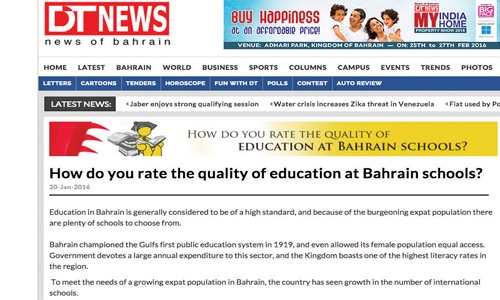Debate on quality of edu at schools
A quality education has the power to transform societies in a single generation, provide children with the protection they need from the hazards of poverty, labour exploitation and disease, and given them the knowledge, skills, and confidence to reach their full potential, British actress and humanitarian Audrey Hepburn once said.
Education in Bahrain is generally considered to be of high standard, and because of the burgeoning expat population there are plenty of schools to choose from. Bahrain championed the Gulf’s first public education system in 1919, and even allowed its female population equal access.
The government devotes a large annual expenditure to this sector, and the Kingdom boasts one of the highest literacy rates in the region. To meet the needs of a growing expat population in Bahrain, the country has seen growth in the number of international schools.
The curriculum taught in the schools in Bahrain varies from institution to institution. Each has its own unique study plan, course schedule and textbooks. Final exams and certificates granted also differ from school to school. Yet, according to a report last March, about 81 per cent of private schools and 68pc of government schools have been ranked as only satisfactory or inadequate by Bahrain’s education watchdog, the National Authority of Qualifications and Quality Assurance for Education and Training (QQA).
It ranked educational institutes on a four point system; excellent, good, satisfactory and inadequate. However, it did not specify the reasons behind the schools scoring such low results. Well, How do you rate the quality of education at Bahrain schools? Tell us what you think of the current educational system in Bahrain? DT News asked this question on its website and here are the responses from the readers:
Sushanth Nair:
Schools in Bahrain has to ensure continuous improvement of their overall performance by adopting suitable ways. Practical skills must be developed because that seems to be missing in students here. More effective teaching and learning strategies will help develop students’ thinking ability. Students must be provided with more opportunities to develop self-confidence.
Peter Cane:
More effective differentiation must be made in less effective lessons to meet students’ needs, especially, low achievers. More individualised support and further challenge has to be given to the more able students. Development of students’ problem solving and critical thinking skills is missing in many schools.
Mohammed Ahmed:
The effectiveness of support and guidance system is inadequate in several schools. More rigorous monitoring of students’ safety in the transportation system is also needed. Regular self-evaluation is needed and must involve all those concerned. The schools need to develop a more robust monitoring system to ensure a stronger impact of professional development programmes on teachers’ performance.
Sandra Paul:
The overall effectiveness at private schools is satisfactory due to the adequate level of students’ academic achievement, personal development and the satisfactory effectiveness of teaching and learning. Students attain high pass rates in internal assessments. However, many schools need to further improve teaching and learning, with a particular focus on raising students’ academic achievement across the schools particularly in Arabic .
Fawaz:
Private schools have no or minimum supervision. Their aim is to maximise profit which is affecting education service levels.
Ayesha Jameel:
The standard of education has become quite good as I noticed the Ministry of Education has started monitoring the progress in private schools. But the sole problem highlighted by all Bahraini parents is about the private school fees structure. How could Bahraini nationals afford to pay high fees if they have more than one child with no educational support? Every parent wants to provide good education for his/her child, but school fees become a barrier.
Related Posts

